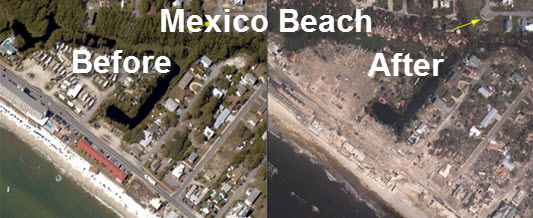Florida's 'Forgotten Coast' Really Forgotten
Posted June 27, 2019 02:55 pm

Photos: NOAA
TALLAHASSEE – Residents of Florida’s Panhandle often refer to their region as “The Forgotten Coast.”
Turns out, a significant number of their fellow Floridians think of it that way, too. That is, when they think of it at all.
And that is having costly repercussions for devastated Panhandle communities as they recover from Hurricane Michael’s Oct. 10 Category 5 rampage across the region that killed 26 people, left 1.1 million without electricity, damaged or destroyed more than 144,000 homes, wrecked 2.8 million acres of agricultural/forest land and caused an estimated $12 billion in economic damages.
According to a Sachs Media Group survey of 1,000 Floridians conducted between June 7-11, nearly half said they would do nothing to help Hurricane Michael’s Panhandle victims and nearly 75 percent said they would not consider donating money to help with relief efforts.
The survey found South Florida respondents offered the lowest support for Panhandle recovery efforts. Nearly half didn’t know which hurricane had hit the Panhandle and fewer than half understood how severe Hurricane Michael was.
Statewide, according to the survey, more than half the respondents – those aware that there was a record storm in the Panhandle – didn’t feel there was a need to contribute to the recovery effort because they believed life had returned to normal in the region.
The survey was conducted as part of National Hurricane Survival Initiative to measure statewide awareness of the storm and its enduring impacts on the region and the state, and on behalf of Rebuild 850, an advocacy group established in November.
Clearly, Rebuild 850 has its work cut out for it in sustaining interest in the region’s recovery as storm-fatigued Floridians enter a new hurricane season and the Panhandle is still struggling with homelessness, unemployment and mental health issues in Michael’s wake.
“Many Panhandle residents feel like they’ve been forgotten by their state,” said former Congresswoman Gwen Graham, who co-hairs Rebuild 850 with former Florida House Speakers Allan Bense and Will Weatherford.
“These survey results are incredibly frustrating,” Graham continued in a statement. “Families are camped out in tents and children are struggling with anxiety, and Floridians in other areas of the state are unaware.”
According to the survey, more than one in four respondents believe homelessness and unemployment are no longer issues following the storm in the Panhandle, and more than 75 percent believe mental health, food insecurity and the threat of wildfires – with an estimated 72 million tons of downed trees and debris still on the ground – are no longer concerns.
Although the state earmarked as much as $2.8 billion in its Fiscal Year 2020 budget – much already spent and some eventually to be reimbursed by federal grants – it took 237 days after Michael for Congress to overcome partisan paralysis to approve a $19.1 billion federal disaster relief bill on June 3.
It includes assistance for victims of natural disasters across the country since 2017, ranging from Midwest floods to California wildfires to Hawaiian volcano eruptions to hurricanes in the Southeast, in addition to Hurricane Michael.
The bill includes $1.67 billion to repair Tyndall Air Force Base, $2.4 billion in Community Development Block Grants disaster relief funding, $1.65 billion to rebuild damaged highways, $600 million in economic assistance programs, $480 million for timber restoration and $150 million for fishery losses that Panhandle residents, businesses and governments can tap into.
“While we’re thankful for the federal and state funding the Panhandle relief and coverage effort has received, we need to come together as Floridians to do even more,” Weatherford said in the Rebuild 850 release. “This was the second most powerful storm to ever hit the mainland United States, and it will continue to take more time and money to recover and rebuild.”
“These Panhandle residents need the support of our entire state,” Bense said. “These communities are suffering. We’re all Floridians, and we need to come together. We are urging all Floridians to lend a hand to our most vulnerable citizens.”
-------------------------------
This piece appeared in the The Center Square and was reprinted by the Columbia County Observer with permission or license.
Layout and graphic by the Observer

 By
John Haughey | The Center Square
By
John Haughey | The Center Square